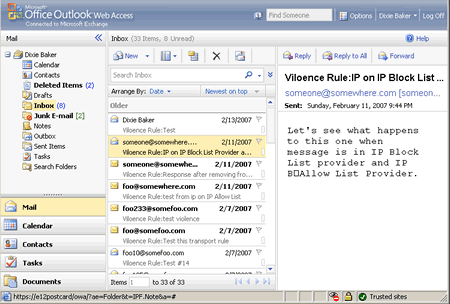SEE ME, HEAR ME - I exist don't I?
The idea started when, in my junior year of high school, a new friend, Dan Senyk, and I started writing music about a girl in our chemistry class. This girl was like the village bicycle and the lyrics wrote themselves. Dan picked up his Les Paul and banged out some righteous power chords as I began to sing some of the aforementioned nonsense, creating something that somewhat resembled music. We recorded our "masterpiece" and thought we were brilliant.
Our little musical exploration left me wanting more, so I called up Dan and told him I wanted to play bass. He discouraged (mildly) my intentions and said I should, instead, learn the guitar. Dan, for all his idiosyncrasies, had the right idea (even as destiny would have it, I eventually ended up on the bass). Through playing the guitar, I learned everything I needed to know about musical theory and song writing. This is all thanks to Dan's influence, chiefly.
Dan and I would go on to write many more ridiculous parodies before having to focus on 'growing up'. The important thing was that I was finally being noticed for anything at all really. I learned I had a passion for music that I never knew existed. Even though we covered and wrote more serious music, looking back it would have benefited our time more if we just stuck to being clowns. It was the entire basis of our friendship, after all, and it really got me through some tough times. It's too bad I never got to thank him for that...
BASSICALLY MY PASSION FOR MUSIC
At some point I turned to the bass. There was something about the bass guitar that struck a chord with me. The execution of the bass varied with the emotion being portrayed, but through it all the bass is the glue that holds everything together.
I mostly approach bass parts as a mystery that needs to be solved. With all the varying approaches that are out there, it really feels like no one has really got it "figured out". Should I pluck with my fingers/pick/slap/tap? Am I following the drummer or am I just duplicating the guitar... or something else entirely? Should I sit in the pocket or should I show off? Is this the song where I finally get to pull out that solo I've been mastering?
A solid bass line allows the guitarist(s) to wail on solos without care for the direction the rest of the band is headed in. A solid bassist allows the drummer to throw in a fill or get creative because the beat is locked down. The singer always knows that when the drummer is acting like a 2 year old and the guitarist is too vain, the bassist is there to be his/her wingman and get him/her through it.
MY ROLE
So while I knew why I was such a bass enthusiast from a musical perspective, I never connected the dots on what it meant to me personally. Recently I had a revelation regarding this. Being the glue is really what I do. I grew up being glue!
It never mattered how I kept everyone around me happy, it only mattered that they stayed together. My sense of humor, my hard work and determination, my inability to confront others about my own personal unhappiness; all things I do to keep things around me stable.
I know I exist now; I'm beyond that. Going forward, I want to be the glue for people that support me. When you are young and after that, you are forced to support people that do not support you back. You do not get to choose these people and that is OK.
The bassist typically works in the background, unacknowledged for his or her important work. Case in point (for non musicians), name one famous bassist? You probably can't! The bassist is the underdog yet serves such a critical role. I like being the underdog as well. When you watch a band play, there are no expectations for the bassist. That is when I have the opportunity to 'wow' everyone. This is also how I feel about my role in life. Not only can I make a group 'stay together', I'll make it the best experience it can possibly be. And no one was expecting it.

